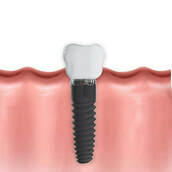Dental Implants |
Price: Starts at Rp12,000,000 (excluding Crown)
|

Dental Implant uses
Implants are primarily used to support a dental prosthetic such as a crown to replace damaged or non-healthy teeth. The implant when correctly placed and integrated with the natural bone can support physical loads from heavy usage for decades without problems. After a successful implant procedure, it is difficult to see or distinguish the real teeth from the prosthetic teeth. Dental implants can also be used to help support bridges which can connect to more than one implant and be used as anchor points to support several 'false teeth'. These implants would be considered as non-removable. However an implant can be used to support a fixed or removable dental prosthesis or dental crown. The crown can be removed from the implant abutment with finger pressure.With the use of special types of 'connectors' implants placed in the facial bones can be used to hold either fixed or removable prosthetics, even facial prosthetics used for facial deformities resulting from cancer treatment other extreme injuries. Dental Implants with a smaller diameter can be used in orthodontics as Temporary Anchorage devices (TAD's) which are able to assist correctional tooth movement. The forces created using these sturdy anchor points helps cause bone remodeling by stimulating cells in the periodontal ligament. These types of implants are normally easily removed following the completion of the orthodontic treatment. Some considerations when planning to have an Implant are your general health condition, local oral local health condition such as mucous membranes, jaw and bone health together with conditions of adjacent and opposite teeth. The main risks of failure of implants are normally those associated with increased risk for a variant gum disease called peri-implantitis such as: bad oral hygiene; heavy smokers; diabetics. Risk of early implant failure is increased by diseases that affect the bones (osteoporosis) or long term steroid use. Other caution areas: Special consideration should be given when planning implants if you are using any type of bone building drugs like anti-RANKL or bisphosphonates. Risk although low can cause a disorder called Medication-associated osteonecrosis of the jaw (MRONJ). Small traces of the drugs can remain for months or even years although the risk is still deemed to be very low for normal use of the drug and it is concluded that the affect on implant survival is negligible. However, the risk becomes higher and it is recommended NOT to use implants in individuals with certain conditions or drug usage as follows: intravenous therapy; certain lower jaw procedures; steroid usage; use of strong dosage of bisphosponates or those taking the drug for more than 3 years; high dosage /high-frequency intravenous therapy for cancer care. |
Call +62 859 537 88306 or fill in the
|
Other Considerations
There is nothing more precious than having your original permanent teeth. But as they say, nothing is permanent in this world. And even in the premise of dentistry, even your permanent teeth, which should last a lifetime, rarely do. When teeth decay or break and have to be removed, that beautiful smile is lost and the worst that can happen is gum disease which may not allow dentures or other prosthetics like implants to ‘fill the gaps’.
However it’s not all that bad, since dental technology today has come a long way and in 99.9% of cases something can be done to bring back that smile. At Bali Dental surgery in Kuta, Denpasar we not only have the technology but also the specialists to use it.
Dental implants at our Kuta, Bali clinic will give you lifetime permanent teeth. Unlike dentures, dental implants are embedded into your jawbone. Beneath your gum line is your jawbone that can accommodate the implanting of titanium posts. This is surgically done by your dentist and is a unique procedure that has a lot of oral health benefits.
However it’s not all that bad, since dental technology today has come a long way and in 99.9% of cases something can be done to bring back that smile. At Bali Dental surgery in Kuta, Denpasar we not only have the technology but also the specialists to use it.
Dental implants at our Kuta, Bali clinic will give you lifetime permanent teeth. Unlike dentures, dental implants are embedded into your jawbone. Beneath your gum line is your jawbone that can accommodate the implanting of titanium posts. This is surgically done by your dentist and is a unique procedure that has a lot of oral health benefits.
Treatment: Implants Procedure
Before you consider dental implants, make sure with your dentist that you have healthy gums and jawbone to support the implants. For people who have thin jawbone, they can still opt for dental implants, but the dentist will implement bone grafting, a surgical procedure performed for bone fracture repairs.
A sinus lift can also done in cases when there is not enough height in the upper jawbone. The importance is that your dentist will carry out a complete medical and dental evaluation before proceeding with the implants.
Dental implants are a more costly treatment when it comes to tooth restoration. However, the success of dental implants at Kuta Bali Dentist is for long-term benefits. In fact, strength wise, they are far better than having the permanent teeth, which inevitably decay or fall out if not given appropriate dental care.
A sinus lift can also done in cases when there is not enough height in the upper jawbone. The importance is that your dentist will carry out a complete medical and dental evaluation before proceeding with the implants.
Dental implants are a more costly treatment when it comes to tooth restoration. However, the success of dental implants at Kuta Bali Dentist is for long-term benefits. In fact, strength wise, they are far better than having the permanent teeth, which inevitably decay or fall out if not given appropriate dental care.
Endosteal Implants
At the Dentist, Bali branch , endosteal dental implant is one of the most common types of implant that our dentists perform. This procedure involves the implant post being drilled directly into your jawbone.
After the implants have been placed, considerable time is allowed for the gum tissue to be healed. New bone cells will grow on and around the implant post, ensuring that the post has integrated well with the jawbone, making the jawbone strong enough to support new crowns. No dental appliance should be worn for a few days after the surgery as the area must not be subject to any pressure yet..
It would usually take between three and eight months, at which stage the implant will be exposed and evaluated. This is to check if the implant has successfully locked in to its place. If not, your dentist will make the necessary changes, either to replace the implant or to move it to another area.
The second stage of the surgical procedure is to create an opening in the gum to expose the implant and place a post, known as a healing cap. This is done so a tooth can be attached to the post which will extend above the gum line into the mouth. The cap is to give a shape to the gum tissue and give support to the gum or bridge.
The final phase is to attach an abutment or a connector, and this will be used to hold the crown when it is slid through and attach it there firmly into position. At this stage, your final prosthesis can be constructed. It is normal that the fees for the implant and the prosthesis are separate. Ask your Bali dentist for pricing details.
After the implants have been placed, considerable time is allowed for the gum tissue to be healed. New bone cells will grow on and around the implant post, ensuring that the post has integrated well with the jawbone, making the jawbone strong enough to support new crowns. No dental appliance should be worn for a few days after the surgery as the area must not be subject to any pressure yet..
It would usually take between three and eight months, at which stage the implant will be exposed and evaluated. This is to check if the implant has successfully locked in to its place. If not, your dentist will make the necessary changes, either to replace the implant or to move it to another area.
The second stage of the surgical procedure is to create an opening in the gum to expose the implant and place a post, known as a healing cap. This is done so a tooth can be attached to the post which will extend above the gum line into the mouth. The cap is to give a shape to the gum tissue and give support to the gum or bridge.
The final phase is to attach an abutment or a connector, and this will be used to hold the crown when it is slid through and attach it there firmly into position. At this stage, your final prosthesis can be constructed. It is normal that the fees for the implant and the prosthesis are separate. Ask your Bali dentist for pricing details.
Possible Risks from the Surgery
As to any surgery, dental implant surgery is not exempt from risks. The possible risk associated with dental implants can be in the tooth restoration or in the operation itself although the actual risk is extremely small.
These include:
These include:
- Pain
- Bleeding
- Swelling
- Infection
- Facial bruising following surgery
- Bone fracture
- Muscle spasm
- Nerve damage to the surgical site that will cause numbness, pain or tingling sensation in the lips, chin, and tongue
The Subperiosteal Implants
Subperiosteal implants involve a metal frame being placed and fitted into your jawbone. A frame is used instead of a post if your jawbone is not healthy enough to support implants. Similar to endosteal implants, subperiosteal implants hold the prosthetics or artificial teeth.
Aftercare
While healing, your dental practitioner at kuta bali dental clinic may prescribe some or all of the medications as follows:
- Take pain relievers as directed to reduce pain
- Antibiotics to prevent infection
- Steroids against inflammation
- Use ice packs to ease swelling
You may also want to take a look at our Veneers Treatment, or just go back Home

